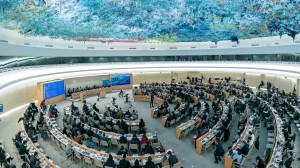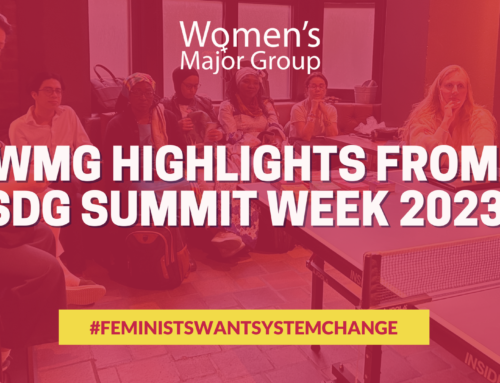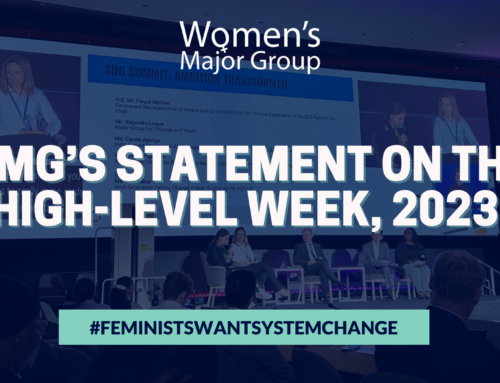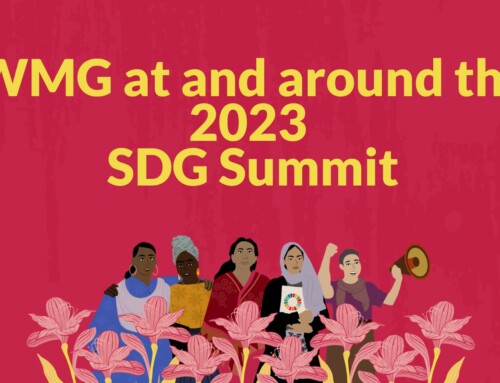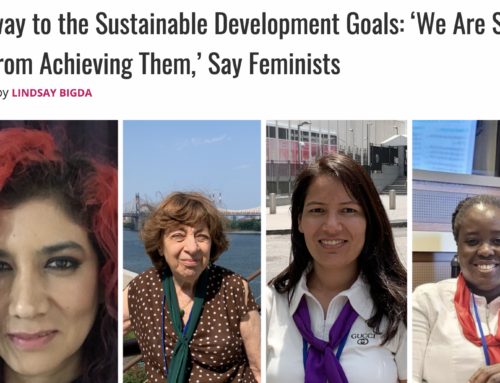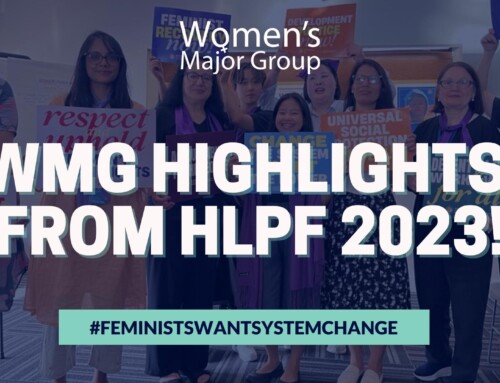UN Women’s briefing on the Gender Equality Forum
Human Rights Council, 25 February 2020
First of all, I would like to thank UN Women for the invitation – it is really an honour to be
here today.
I also take the opportunity to congratulate and thank the governments of France and Mexico
for taking up the challenge and host the upcoming Generation Equality Forum.
My name is Valerie Bichelmeier – I am the VP and main representative at the UN in Geneva
of Make Mothers Matter, an international NGO advocating for women’s rights – or more
specifically the rights of women in their role as mothers.
I am also an active member of the NGO Committee on the Status of Women Geneva. But
today I am representing the Women’s Major Group – which is a self-organised network of
hundreds of women’s rights organisations from all over the world, and which continuously
provides input, the gender lens, into the global policy processes on Sustainable Development
The UNECE Beijing+25 Forum
The Women’s Major Group has organised the CSO Forum, which took place last October
just before the UNECE Beijing+25 Regional Review meeting here Geneva.
Under the motto Feminists want system change, this CSO Forum gathered more than 400
women rights activists from nearly 300 organisations and 48 countries of the UNECE region.
It is a great example of CSO self-organising and working hard – all too often on a voluntary
basis.
Most of the substantive work started well before the forum, with participants working in self
organised groups on factsheets assessing the implementation of the Beijing Platform for
Action in the different sub-regions, and on different topics in relations to the 12 areas of
concerns of the platform – and making recommendations.
15 of these civil society representatives were able to take the floor at different sessions
during the UNECE Intergovernmental meeting, including a young activist from Turkey at the
opening. Based on the factsheets, they delivered our key concerns and recommendations.
Collaboration with UN agencies was key to the success of our Forum – And we would like to
take this opportunity to thank especially UN Women and the UNECE for their great support
and the fruitful collaboration – UN Women also generously contributed with logical and
financial support – including the sponsoring of 50 civil society representatives from the
eastern regions – that was much appreciated and key to the success of the Forum – so
again thank you.
I think that our message was clear: we want systemic change and we hope that the action
coalitions that will be launched with the Generation Equality Forums will deliver and bring
about such systemic change.
The Generation Equality Forum
As was already mentioned earlier, the Generation Equality Forum and action coalitions are
multi-stakeholder – and we think it is indeed critical to involve everyone. However, the
process MUST remain civil society cantered.
So how is civil society involved ?
To this effect, Civil society is represented in the core group that make the decisions…
And under the auspice of UN Women, a Civil Society Advisory Group has been established
last Summer which is composed of 21 civil society representatives. These were selected
through a civil society–led process to represent the diversity of constituencies and regions.
The role of this Civil Society Advisory Group is to support the decision-making of the Core
Group, in order to ensure that civil society’s priorities are indeed reflected in the organisation
and the outcome of the Forum.
To complement this Civil Society Advisory Group, an Advisory Working Group was also
established by the NGO Committee on the Status of Women New York, under the dynamic
leadership of its chair, Houry Geudelekian. This advisory working group is open to everyone.
About 450 women rights activist from all over the world participate, and Zoom meetings are
held every 2 weeks to share information and receive input and feedback – which is then
conveyed to the Advisory group.
Action Coalitions
The themes of the action coalitions were recently announced, and leadership is currently
being discussed.
• To echo CEDAW Expert Ms Rana and the representative of WILPF who spoke this
morning, we regret that Peace and Security is missing, and we hope that this will be
redressed.
• Regarding the leadership of the action coalitions, needless to say that these leaders must
be Gender Equality and human rights champions.
• We also want to highlight the importance of choosing leaders who are progressive and
do not move back on the language set in the BPfA 25 years ago. We expect an open and
constructive dialogue on sensitive issues, and commitments to leading on issues that
brings us together and not further polarise.
Feminist and Women’s Movement Action Plan
In parallel, Feminist and women’s rights organisations plan to use the Beijing+25 process to
advance a Feminist and Women’s Movement Action Plan.
The idea is to use the power of existing commitments, that is not only the Beijing Platform for
Action, but also the SDGs, CEDAW and other international treaties, human rights
mechanisms and all relevant international commitments (e.g., International Conference on
Population and Development Programme of Action, New Urban Agenda of Habitat UNSC
Resolution 1325 and related resolutions, and the Paris Climate Accord), to promote
accountability and prompt action to achieve a gender-equitable and sustainable world.
Work is led by 2 members of the advisory working group. And again, Zoom meetings are
held every 2 weeks and open to all women rights activists. Thematic working groups were
formed on the six cluster themes used for the Beijing+25 review, and work is in progress.
Funding
So, everything seems to be in place to ensure that civil society and women themselves are at
the centre of the Beijing+25 process.
However, too many women’s organisations remain underfunded or not funded at all. Such
lack of funding seriously puts the advancement of women’s rights and gender equality, at
risk.
A commitment to gender equality must also go hand in hand with adequate funding of
women’s rights organisation – beginning with sponsoring of women’s rights activists –
especially youths and representatives from the global south- to participate in the generation
equality forum.
Conclusion
The world has dramatically changed since the Beijing Conference, with the raise of Internet
and the advent of mobile communication, the rise of migration – especially women’s
migration, and climate change becoming a harsh reality for many – among many other
transformations.
While the BPfA remains a landmark document and a key reference for action, the Generation
Equality Forum and the Action Coalitions offer an opportunity not to be missed to both deliver
on the commitments made 25 years ago and take into account these tremendous changes.
I’ll end with a (short) quote, which was the conclusion of the statement delivered by our youth
activist at the opening of the UNECE regional meeting:
“We are calling on you to put considerable time, effort, and funding into implementing the
commitments that you have made as States. Let’s walk the talk.”
Thank you

